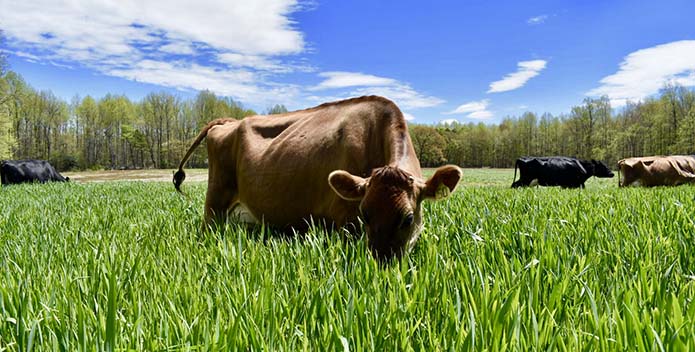This op-ed originally ran in the Daily Item.
Crossing the 10-mile stretch of windswept Chesapeake Bay water would be the last leg of our six-hour journey from beautiful, rolling Pennsylvania farmland to Port Isobel and then the historic fishing village on Tangier Island, Virginia.
Our group of farm couples and agriculture conservation professionals was headed to the heart of the Bay to get a better understanding of how their efforts affect its water quality, and how their livelihoods are connected to those of watermen.
“Watermen” is a common reference for those who make their living fishing and harvesting crabs and oysters as “farmers” of the Bay.
Time on the Bay may be routine for some Chesapeake Bay Foundation (CBF) staff, but it was anything but routine for me, my CBF colleagues from Pennsylvania and our guests.
We enjoyed three days out of CBF’s education center on Port Isobel, setting crab traps, dredging for oysters, checking nitrogen levels of the water, and enjoying the bounty of the Bay for dinner each night. It was a true respite from the daily routine for those who farm and we who work in CBF’s Harrisburg office.
The first-day visit to Tangier included the sounds and sights of watermen motoring through the narrow channel; lonely spotlights guiding the way through morning darkness toward their distant crab traps.
The hum of the diesel engines of those traditional sharp-bowed Bay workboats isn’t all that different than the sound of early morning farm tractors delivering feed to hungry heifers back at the farm.
Many similarities between the waterman and farmer were easily recognized by the group.
Less obvious to those outside the two occupations is the parallel challenge that survival for farmers and watermen depends on endurance and family strength during the low points of foul weather and poor prices.
The second evening of our visit included a dessert social that brought watermen to the farmers’ dinner table. We had a lively and fun-filled discussion that further identified common ground between the two occupations.
It was during that time that the unexpected happened. One of the watermen asked farmers if they could afford health insurance. Silence.
Then there were discussions and some very real testaments to personal triumphs over injury and long, drawn-out efforts to meet medical bills. My colleagues and I felt immediate respect for the family farmers and watermen that we shared the island with that evening.
So, let’s be clear. Business and personal risks for farmers are immense, with limited financial reward.
In Pennsylvania, we are also counting on farmers to implement conservation measures that will improve the water in our river and streams and contribute to the healthful and idyllic environment we all enjoy.
I’m privileged to know farmers and the conservation needs of our environment. We can’t neglect either!
I believe that everyone wants Pennsylvania’s farmers to succeed. Agriculture is one of Pennsylvania’s most important industries, and many people move to Pennsylvania because they enjoy the rural charm of farm country. The boots on the ground—the farmers and the conservation community—are leading the way. It’s time state legislators invest in them.
As we give thanks this season, let’s remember the important sacrifices our farmers and watermen make. This Thanksgiving, they are providing the plentiful food we’ll all enjoy.
Let’s also make sure our Pennsylvania legislators are providing necessary resources so that farmers can install conservation practices that benefit us all.
Pennsylvania cannot afford to miss this opportunity.
Bill Chain, CBF's PA Assistant Director & Sr. Ag. Program Manager



